Analyzing Organic Consumption in Ecuador with the Theory of Planned Behavior and the Norm Activation Theory
Main Article Content
Abstract
The objective of this investigation is to determine the behavior of Ecuadorian consumers regarding the organic products market. For this purpose, a theoretical model has been developed that integrates the theory of planned behavior and the theory of norm activation. For the analysis of results, the SEM-PLS technique has been applied. The results indicate that personal norms have a primary effect in influencing purchase intention, while perceived control and subjective norms, probably due to the effect of personal norms, do not develop significant relationships. Finally, since the explained variance of the endogenous variables is low, future research could broaden the theoretical spectrum by including other aspects related to consumer personality.
Downloads
Article Details

This work is licensed under a Creative Commons Attribution-NonCommercial-ShareAlike 4.0 International License.
1. Derechos de autor
Las obras que se publican en 593 Digital Publisher CEIT están sujetas a los siguientes términos:
1.1. 593 Digital Publisher CEIT, conserva los derechos patrimoniales (copyright) de las obras publicadas, favorece y permite la reutilización de las mismas bajo la licencia Licencia Creative Commons 4.0 de Reconocimiento-NoComercial-CompartirIgual 4.0, por lo cual se pueden copiar, usar, difundir, transmitir y exponer públicamente, siempre que:
1.1.a. Se cite la autoría y fuente original de su publicación (revista, editorial, URL).
1.1.b. No se usen para fines comerciales u onerosos.
1.1.c. Se mencione la existencia y especificaciones de esta licencia de uso.
References
Al Zaidi, S. M., Iyanna, S., Jabeen, F., & Mehmood, K. (2023). Understanding employees’ voluntary pro-environmental behavior in public organizations – an integrative theory approach. Social Responsibility Journal. https://doi.org/10.1108/SRJ-04-2022-0176
Andrade, C. M., & Ayaviri, D. (2018). Demanda y Consumo de Productos Orgánicos en el Cantón Riobamba, Ecuador. Información Tecnológica, 29(4). https://doi.org/10.4067/s0718-07642018000400217
Araya Pizarro, S., & Rojas Escobar, L. (2021). Cuidado de la salud como determinante del consumo de alimentos orgánicos en Chile. Idesia (Arica), 39(1). https://doi.org/10.4067/s0718-34292021000100059
Aslam, W., Noor, R. S., Ullah, S., & Chen, H. (2020). Factors affecting organic productions and its consumption approaches towards consumers: A case study of Punjab province. Asian Journal of Agriculture and Biology, 8(3), 274–280. https://doi.org/10.35495/AJAB.2020.02.105
Bagozzi, R. P., Yi, Y., & Phillips, L. W. (1991). Assessing Construct Validity in Organizational Research. Adm. Sci. Q., 36(3), 421–458. https://doi.org/10.2307/2393203
Chaudhary, R., & Bisai, S. (2018). Factors influencing green purchase behavior of millennials in India. Management of Environmental Quality: An International Journal, 29(5), 798–812. https://doi.org/10.1108/MEQ-02-2018-0023
Cheng, H., Rui, Q., Yu, K., Li, X., & Liu, J. (2022). Exploring the Influencing Paths of Villagers’ Participation in the Creation of Micro-Landscapes: An Integrative Model of Theory of Planned Behavior and Norm Activation Theory. Front. Psychol., 13, 862109. https://doi.org/10.3389/fpsyg.2022.862109
Dijkstra, T. K., & Henseler, J. (2015). Consistent partial least squares path modeling. Miss. Q., 39(2), 297–316. https://doi.org/10.25300/MISQ/2015/39.2.02
Esfandiar, K., Dowling, R., Pearce, J., & Goh, E. (2021). What a load of rubbish! The efficacy of theory of planned behaviour and norm activation model in predicting visitors’ binning behaviour in national parks. J. Int. Hosp. Leisure Tour. Manag., 46, 304–315. https://doi.org/10.1016/j.jhtm.2021.01.001
Faletar, I., Kovačić, D., & Cerjak, M. (2021). Purchase of organic vegetables as a form of pro-environmental behaviour: Application of Norm Activation Theory. Journal of Central European Agriculture, 22(1), 211–225. https://doi.org/10.5513/JCEA01/22.1.3026
Farrukh, M., Raza, A., Mansoor, A., Khan, M. S., & Lee, J. W. C. (2022). Trends and patterns in pro-environmental behaviour research: a bibliometric review and research agenda. Benchmarking. https://doi.org/10.1108/BIJ-10-2020-0521
Fornell, C., & Larcker, D. (1981). Evaluating Structural Equation Models with Unobservable Variables and Measurement Error. J. Mark. Res., 18, 39–50. All Papers/F/Fornell and Larcker 1981 - Evaluating Structural Equation Models with Unobservable Variables and Measurement Error.pdf
Higuchi, A. (2015). Characteristics of Consumers of Organic Products and the Increase in the Supply of These Products in Metropolitan Lima, Peru. Universidad Del Pacífico, Lima, XLII.
Jöreskog, K. G. (1971). Statistical analysis of sets of congeneric tests. Psychometrika, 36(2), 109–133. https://doi.org/10.1007/BF02291393
Kamalanon, P., Chen, J.-S., & Le, T.-T.-Y. (2022). “Why Do We Buy Green Products?” An Extended Theory of the Planned Behavior Model for Green Product Purchase Behavior. Sustainability, 14(2), 689. https://doi.org/10.3390/su14020689
Koklic, M. K., Golob, U., Podnar, K., & Zabkar, V. (2019). The interplay of past consumption, attitudes, and personal norms in organic food buying. Appetite, 137, 27–34. https://doi.org/10.1016/j.appet.2019.02.010
Manh Hung Le, & Phuong Mai Nguyen. (2022). Integrating the Theory of Planned Behavior and the Norm Activation Model to Investigate Organic Food Purchase Intention: Evidence from Vietnam. Sustainability (Switzerland), 14(2). https://doi.org/10.3390/su14020816
Mejía Giraldo, & Juan Felipe. (2021). El consumo responsable como una expresión de compromiso desde el principio de reciprocidad. Redmarka. Revista de Marketing Aplicado, 25(1), 61–80. https://doi.org/10.17979/redma.2021.25.1.8093
Müller Pérez, J., Amezcua Núñez, J. B., & Müller Pérez, S. (2021). Intención de compra de productos verdes de acuerdo con la Teoría del Comportamiento Planeado: Incorporación de la obligación moral al modelo. RAN. Revistas Academia y Negocios, 7(1), 15–30. https://doi.org/10.29393/ran6-2icjm30002
Munerah, S., Koay, K. Y., & Thambiah, S. (2021). Factors influencing non-green consumers’ purchase intention: A partial least squares structural equation modelling (PLS-SEM) approach. Journal of Cleaner Production, 280. https://doi.org/10.1016/j.jclepro.2020.124192
Osorio, F. F., & Londoño, J. C. (2015). Intención emprendedora de estudiantes de educación media: extendiendo la teoría de comportamiento planificado mediante el efecto exposición. Entrepreneurial Intention in Middle and High School Students: Using the Exposure Effect to Extend the Theory of Planned Behaviour. (English), 28(51).
Piyanoot Kamalanon, Ja-Shen Chen, & Tran-Thien-Y Le. (2022). “Why Do We Buy Green Products” An Extended Theory of the Planned Behavior Model for Green Product Purchase Behavior. Sustain. Sci. Pract. Policy. https://www.mdpi.com/2071-1050/14/2/689
Regalado Pezúa, O., Guerrero Medina, C. A., & Montalvo Corzo, R. F. (2017). Una aplicación de la teoría del comportamiento planificado al segmento masculino latinoamericano de productos de cuidado personal. Revista Escuela de Administración de Negocios, 83. https://doi.org/10.21158/01208160.n83.2017.1821
Sabri, M. F., Razak, N. F., Cheng Xi, E. A., & Wijekoon, R. (2022). Going Green in the Workplace: Through the Lens of the Extended Theory of Planned Behaviour. Pertanika Journal of Social Sciences and Humanities, 30(2), 429–448. https://doi.org/10.47836/pjssh.30.2.02
Si, H., Shi, J.-G., Tang, D., Wen, S., Miao, W., & Duan, K. (2019). Application of the Theory of Planned Behavior in Environmental Science: A Comprehensive Bibliometric Analysis. Int. J. Environ. Res. Public Health, 16(15). https://doi.org/10.3390/ijerph16152788
Soto, L. (2018). Teoría de la activación humana: una oportunidad para el desarrollo de la potencialidad del talento en el contexto escolar. http://bdigital2.ula.ve:8080/xmlui/handle/654321/1501
Streukens, S., & Leroi-Werelds, S. (2016). Bootstrapping and PLS-SEM: A step-by-step guide to get more out of your bootstrap results. European Management Journal, 34(6), 618–632. https://doi.org/10.1016/j.emj.2016.06.003
Vasco, C., Palacios, G., & Paspuel, S. (2015). Determinantes socioeconómicos del consumo de productos ecológicos en Quito. Siembra, 2(1). https://doi.org/10.29166/siembra.v2i1.112
Víctor Corral-Verdugo, María del Carmen Aguilar-Luzón, & Bernardo Hernández. (2019). Bases teóricas que guían a la psicología de la conservación ambiental. Pap. Psicól., 40(2). https://doi.org/10.23923/pap.psicol2019.2897
Yeh, S. S., Guan, X., Chiang, T. Y., Ho, J. L., & Huan, T. C. T. (2021). Reinterpreting the theory of planned behavior and its application to green hotel consumption intention. International Journal of Hospitality Management, 94. https://doi.org/10.1016/j.ijhm.2020.102827




